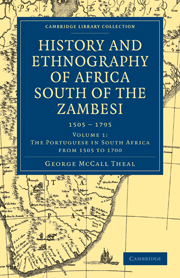Book contents
- Frontmatter
- PREFACE
- Contents
- MAPS AND PLATES
- CHAPTER I THE BUSHMEN
- CHAPTER II THE HOTTENTOTS
- CHAPTER III THE BANTU
- CHAPTER IV DESCRIPTION OF THE BANTU—(continued)
- CHAPTER V DESCRIPTION OF THE BANTU—(continued)
- CHAPTER VI SPECIMENS OF BANTU FOLKLORE
- CHAPTER VII DESCRIPTION OF THE BANTU—(continued)
- CHAPTER VIII ARAB AND PERSIAN SETTLEMENTS IN SOUTH-EASTERN AFRICA
- CHAPTER IX DISCOVERY OF AN OCEAN ROUTE TO INDIA
- CHAPTER X SUCCEEDING VOYAGES AND CONQUESTS
- CHAPTER XI OCCUPATION OF SOFALA AND MOZAMBIQUE
- CHAPTER XII INTERCOURSE OF THE PORTUGUESE WITH THE BANTU
- CHAPTER XIII DISASTROUS EXPEDITIONS UNDER BARRETO AND HOMEM
- CHAPTER XIV EVENTS TO THE CLOSE OF THE SIXTEENTH CENTURY
- CHAPTER XV KNOWLEDGE DERIVED FROM SHIPWRECKS
- CHAPTER XIV APPEARANCE OF RIVALS IN THE EASTERN SEAS
- CHAPTER XVII PROCEEDINGS OF THE DUTCH AND ENGLISH
- CHAPTER XVIII FRUITLESS SEARCH FOR SILVER MINES
- CHAPTER XIX EVENTS OF INTEREST FROM 1628 TO 1652
- CHAPTER XX WEAKNESS OF PORTUGUESE RULE IN SOUTH AFRICA
- Plate section
CHAPTER IV - DESCRIPTION OF THE BANTU—(continued)
Published online by Cambridge University Press: 05 August 2011
- Frontmatter
- PREFACE
- Contents
- MAPS AND PLATES
- CHAPTER I THE BUSHMEN
- CHAPTER II THE HOTTENTOTS
- CHAPTER III THE BANTU
- CHAPTER IV DESCRIPTION OF THE BANTU—(continued)
- CHAPTER V DESCRIPTION OF THE BANTU—(continued)
- CHAPTER VI SPECIMENS OF BANTU FOLKLORE
- CHAPTER VII DESCRIPTION OF THE BANTU—(continued)
- CHAPTER VIII ARAB AND PERSIAN SETTLEMENTS IN SOUTH-EASTERN AFRICA
- CHAPTER IX DISCOVERY OF AN OCEAN ROUTE TO INDIA
- CHAPTER X SUCCEEDING VOYAGES AND CONQUESTS
- CHAPTER XI OCCUPATION OF SOFALA AND MOZAMBIQUE
- CHAPTER XII INTERCOURSE OF THE PORTUGUESE WITH THE BANTU
- CHAPTER XIII DISASTROUS EXPEDITIONS UNDER BARRETO AND HOMEM
- CHAPTER XIV EVENTS TO THE CLOSE OF THE SIXTEENTH CENTURY
- CHAPTER XV KNOWLEDGE DERIVED FROM SHIPWRECKS
- CHAPTER XIV APPEARANCE OF RIVALS IN THE EASTERN SEAS
- CHAPTER XVII PROCEEDINGS OF THE DUTCH AND ENGLISH
- CHAPTER XVIII FRUITLESS SEARCH FOR SILVER MINES
- CHAPTER XIX EVENTS OF INTEREST FROM 1628 TO 1652
- CHAPTER XX WEAKNESS OF PORTUGUESE RULE IN SOUTH AFRICA
- Plate section
Summary
The religion of the Bantu was based upon the supposition of the existence of spirits that could interfere with the affairs of this world. These spirits were those of their ancestors and their deceased chiefs, the greatest of whom had control over lightning. When the spirits became offended or hungry they sent a plague or disaster until sacrifices were offered and their wrath or hunger was appeased. The head of a family of commoners on such an occasion killed an animal, and all ate of the meat, as the hungry ghost was supposed to be satisfied with the smell. In case of the chief or the community at large being affected, the sacrifice was performed with much ceremony by the tribal priest, an individual of great influence, who had as other duties to ward off from the ruler the malevolent attacks of wizards and to prepare charms or administer medicine that would make the warriors who conducted themselves properly and bravely invulnerable in battle.
An instance may be given to illustrate the operation of this religion. Upon the death of Gwanya, a chief of great celebrity in the Pondomsi tribe, he was buried in a deep pool of the Tina river. The body was fastened to a log of wood, which was sunk in the water and then covered with stones. The sixth in the direct line of descent from this chief, Umhlonhlo by name, to save himself from destruction by an enemy became a British subject at his own request, but in October 1880 his clan treacherously murdered three English officials, and went into rebellion, which resulted in his being obliged afterwards to take shelter in Basutoland.
- Type
- Chapter
- Information
- Publisher: Cambridge University PressPrint publication year: 2010First published in: 1907



